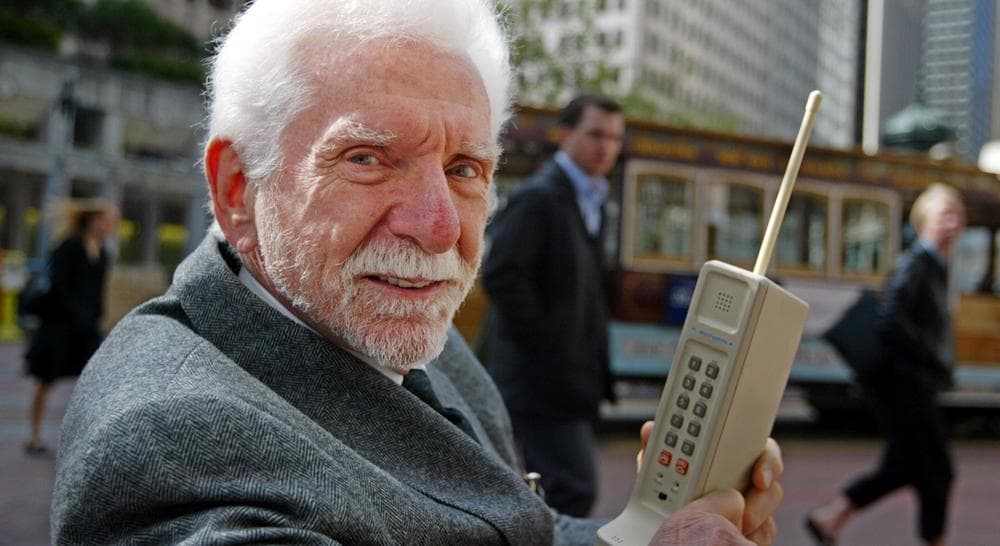Advertisement
The Cell Phone At 40: What Have Our Devices Wrought?
The cell phone hit middle age last week.
Forty years ago, on April 3, 1973, a Motorola inventor named Martin Cooper made the first-ever call on a handheld cellular phone (curiously, to a rival employee at AT&T). When the Motorola DynaTAC 8000X finally became commercially available a decade later, the two pound device cost about $4,000. Known as "the brick," the phone was about as smart as one, too. Then, the BlackBerry and its ilk arrived in the early 2000s, ushering in a new age of instant, on-the-go communication. After the iPhone hit the marketplace in 2007, the smart phone soon became as indispensable as a wallet and keys, and a commonplace accessory to everyday life.
But what changes — for good or for evil — have cell phones wrought? At what cost have we invited these tools into our lives?

Like with other technological innovations, from the automobile to the nuclear weapon, we embrace cell phones without much reflection or question. We embrace them because they are new and because they seem to solve problems. To be sure, these devices come in handy, especially in emergencies. But remember, our smart phones are more than phones: They're actually communicators, a la "Star Trek," cross-bred with small computers. They know all. They cut across time and space. They have turned us into roving reporters and documentarians of our every move and thought and location. They give us the ability to talk and text with anyone on the planet. No longer must we wait and wonder the answer to a question or risk being wrong. With a few quick finger pecks in the Google Search app, mysteries are solvable. Evidence is found. Friends who said they can't make the baby shower because they are "out of town" can be busted, on Facebook, anywhere, anytime.
Smart phones have also ruined trivia nights in Irish bars across our fair city.
Yet, as we step off the cliff of another science fictional precipice — the possible widespread adoption of wearable devices like "smartwatches" and the Google glass head-mounted computer — it's worth considering what questions cell phones already raise.
What does it mean to be in public? What social and interpersonal obligations do we have in our interactions with each other? What does it mean to be "here" — to truly inhabit a physical space — and how do these devices blur the boundaries between presence and absence?
MIT professor Sherry Turkle has documented many of these issues in her book, "Alone Together: Why We Expect More From Technology and Less From Each Other." Her research looks at how online behavior, such as posting on Facebook and tweeting, creates an illusion of closeness and connectedness that, paradoxically, leads to the very solitude from which our technologies supposedly save us.
Personally, my heart drops every time I see parents with their child on the bike path, or in the playground, not interacting, not holding their kid's hand, but punching or jabbering into whatever device they are holding.
Not to mention the endless beeps and interruptions and distractions. Or how my iPhone plays into my already challenged ability to focus. Or how I sometimes feel a phantom buzzing in my pocket. Nope, no one called. But my body has developed an almost Pavlovian response to my iPhone. Studies even suggest our cell phone buzzing activates the same part of the brain connected to feelings of love and compassion. When I've left my cell phone behind, I experience what can only be described as small pangs of separation anxiety. What am I missing? Who might be texting or emailing?
What does it mean to be in public? What social and interpersonal obligations do we have in our interactions with each other? What does it mean to be "here" — to truly inhabit a physical space — and how do these devices blur the boundaries between presence and absence?
I have taken to making rules for myself. I try not to check email or text while I walk from one neighborhood to the next. If I must take a call or write a text while I am already talking with a friend, I will acknowledge the interruption and say, "Excuse me" and leave the room. I try to "be there" when I am there. Wherever I am. I am not always successful.
And yet, as a self-employed person, who works primarily from cafes and other remote locations, I enjoy the freedom my iPhone provides, liberating me from my desk and 9-to-5 environments, even if that freedom comes with a price.
A recent episode helped focused these matters like a laser beam — and made me feel more profoundly how our world has been changed by cell phones. The other night, I walked to my corner bar to watch the Red Sox game. Settling in, I ordered a drink and then began my usual routine of checking email, social media feeds or texting a friend. A moment later I looked up. The bar was empty, except for the bartender, one other patron and me. All three of us were checking our phones, adopting that all-too-familiar hunched over posture, and hypnotized by our respective little windows.
"Well, isn't this funny," I blurted out. "We're all looking at our iPhones at the same time."
The bartender laughed, and the other guy laughed. Then, after a moment of awkwardness, we put down our phones and something miraculous happened: We had a conversation.

